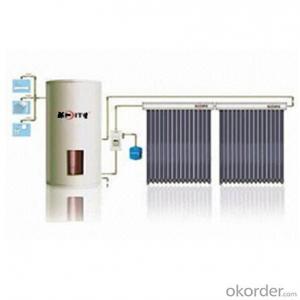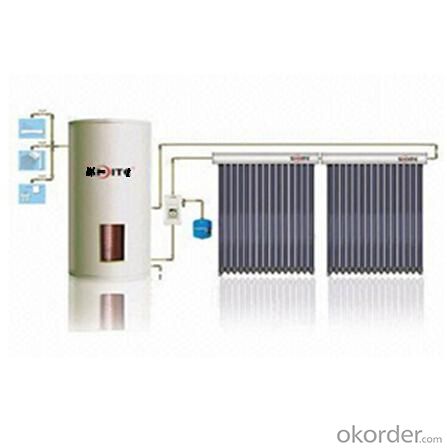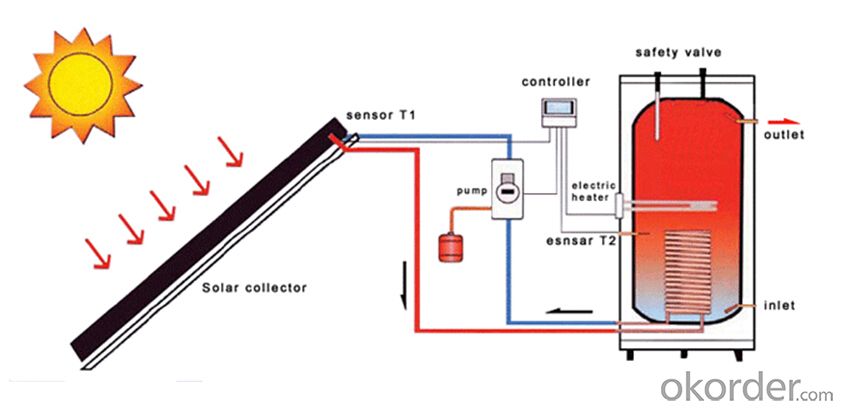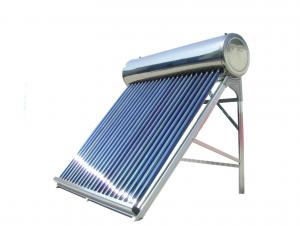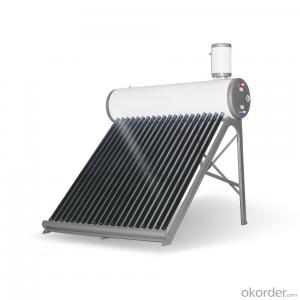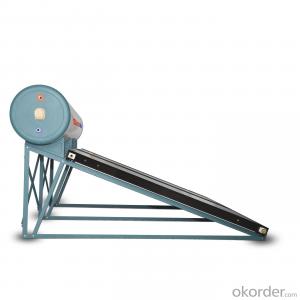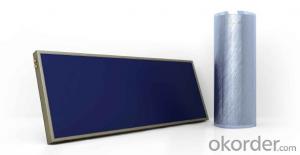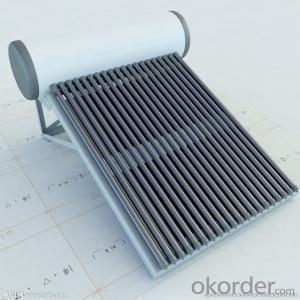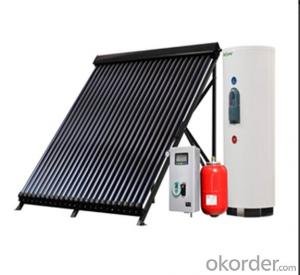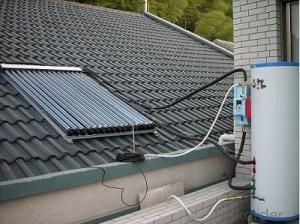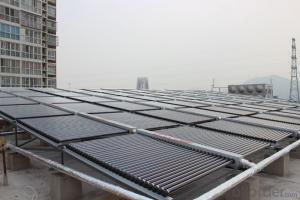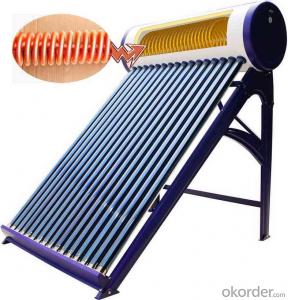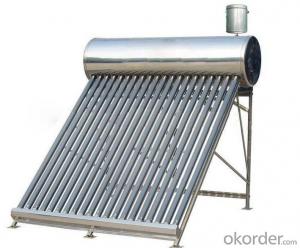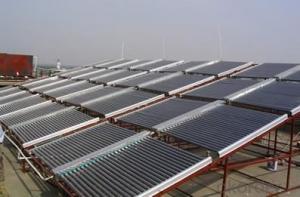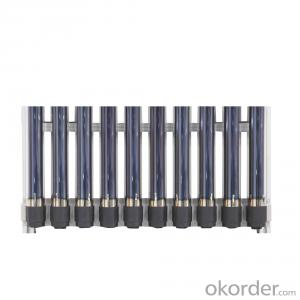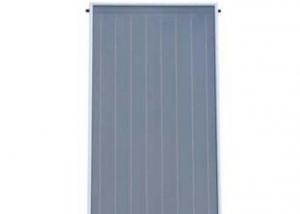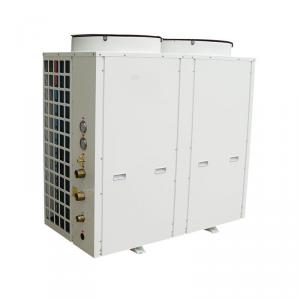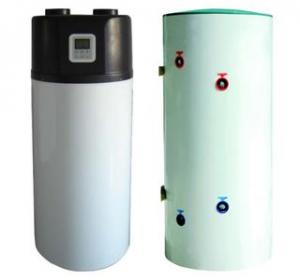Split Solar Heating System with One Copper Coil Inside of Water Tank Model SS-M1
- Loading Port:
- Shanghai
- Payment Terms:
- TT OR LC
- Min Order Qty:
- 1 set
- Supply Capability:
- 2500 set/month
OKorder Service Pledge
OKorder Financial Service
You Might Also Like
1. Structure of Split Solar Heating System with One Copper Coil Inside of Water Tank Model SS-M0
Split Solar Heating System with one Copper Coil Inside Water Tank Model SS-M0 is composed of solar collector, tank with one copper coil, working station and expansion tank, which are linked and controlled by the valves. Solar heating system is really a good supplement of gas or electricity, for when there is rich sunlight in summer, a correctly sized solar system can provide 60%-70% of a household's hot water needs and produces no environmental waste or pollution.
2. Main Features of Split Solar Heating System with one Copper Coil Inside Water Tank Model SS-M1
Food-grade stainless steel SUS304-2B inner tank
High heat transfer efficiency
Combined with auxiliary electricity, gas and other boiler
Easy installation according to the structure of the room
3. Split Solar Heating System with one Copper Coil Inside Water Tank Model SS-M1 Images (showing the working status and the installation instructure)
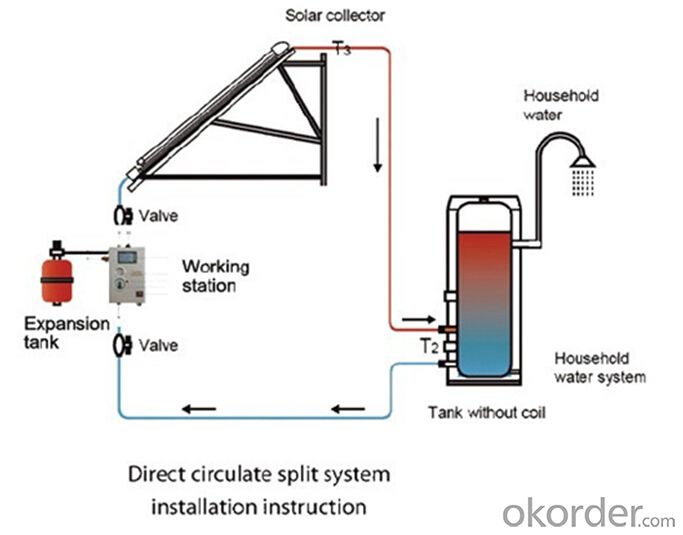
4. Split Solar Heating System with no Copper Coil Inside Water Tank Model SS-M1 Specification
System model | SS-M1-150 | SS-M1-200 | SS-M1 -250 | SS-M1-300 | SS-M1 -400 | SS-M1 -500 |
Tank capacity(L) | 150 | 200 | 250 | 300 | 450 | 500 |
Copper coil qty | 1/2 | 1/2 | 1/2 | 1/2 | 1/2 | 1/2 |
Solar collector model | SC-H-15/20 | SC-H-20/24 | SC-H-25/30 | SC-H-30/20 | SC-H-20/24 | SC-H-25/30 |
Solar collector qty | 1/1 | 1/1 | 1/2 | 1/2 | 2/2 | 2/2 |
Controller model | SR868C8 | SR868C8 | SR868C8 | SR868C8 | SR868C8 | SR868C8 |
Work station model | VSP-S1 | VSP-S1 | VSP-S1 | VSP-S1 | VSP-S2 | VSP-S2 |
Expansion tank spec | 12L | 12L | 18L | 18L | 24L | 24L |
Medium volume | 12L | 12L | 18L | 18L | 24L | 24L |
Recommended Flow | 1.0~2.0L/min | 1.2~2.5L/min | 1.5~3.0L/min | 3.0~5.0L/min | 4.0~7.0L/min | 5.0~8.0L/min |
Max temperature of tank | 95℃ | 95℃ | 95℃ | 95℃ | 95℃ | 95℃ |
Max temperature of system | 95℃ | 95℃ | 95℃ | 95℃ | 95℃ | 95℃ |
Rated pressure of the tank | 0.7MPa | 0.7MPa | 0.7MPa | 0.7MPa | 0.7MPa | 0.7MPa |
Media pre pressure | 0.2~0.3MPa | 0.2~0.3MPa | 0.2~0.3MPa | 0.2~0.3MPa | 0.2~0.3MPa | 0.2~0.3MPa |
Max pressure of system | 0.6MPa | 0.6MPa | 0.6MPa | 0.6MPa | 0.6MPa | 0.6MPa |
Voltage | AC220V 50Hz | AC220V 50Hz | AC220V 50Hz | AC220V 50Hz | AC220V 50Hz | AC220V 50Hz |
Recommended pipe diameter | φ15 | φ15 | φ15 | φ15 | φ22 | φ22 |
5. FAQ
Q1. Can the solar collectors be used in cold conditions?
Re: Yes. Solar collectors of our company can be used under temperatures as low as -30℃, although performance is greatly reduced in such extreme conditions. Good heat output is still achieved in mild sub-zero conditions.
Q2. What happens if one of the solar tubes is broken?
Re: Firstly, tubes are very strong and not easily broken, but if the worst should happen, solar tubes can be replaced very easily. The solar collectors of our company can operate with several broken tubes, but the efficiency will be reduced, so it is recommended that broken tubes be replaced immediately.
Q3. Will water be heated on a cloudy day?
Re: Yes. Although the heat output of the solar collector is reduced on overcast days it will still be able to provide heat. If it is a heavily clouded day or raining, then more gas or electric boosting may be required to maintain water at the required temperature. This system will be automated so you don't have to worry about running out of hot water on a rainy day.
Q4. Can I use a solar collector with my existing hot water system?
Re: Normally yes. Simple retrofit valves can often be used to allow solar collector to connect to your existing cold water inlet. If your tank cannot accept the solar input directly, an additional storage tank can be installed to pre-heat the cold water prior to entering the existing tank.
- Q: Are there any limitations on the water temperature that can be achieved with a solar water heater?
- Yes, there are limitations on the water temperature that can be achieved with a solar water heater. The maximum temperature usually depends on factors such as the amount of sunlight available, the size and efficiency of the system, and the design of the solar collector. In general, solar water heaters can typically reach temperatures between 120 to 160 degrees Fahrenheit (49 to 71 degrees Celsius), which is sufficient for most household needs. However, achieving higher temperatures may require additional heating sources or the use of specialized systems.
- Q: Are solar water heaters expensive to install?
- Solar water heaters can be initially expensive to install, but they can save money in the long run by reducing energy bills and providing a more sustainable and environmentally friendly heating solution.
- Q: Can a solar water heater be used in areas with limited access to backup heating options or alternative energy sources?
- Yes, a solar water heater can be used in areas with limited access to backup heating options or alternative energy sources. Solar water heaters rely on sunlight to heat water, making them a viable option in areas with ample sun exposure. They do not require backup heating options or alternative energy sources, as they are designed to harness solar energy efficiently. Thus, they can provide hot water even in locations with limited access to other heating options or alternative energy sources.
- Q: What is the difference between a flat plate and evacuated tube collector in a solar water heater?
- Two different types of solar water heaters are the flat plate collector and the evacuated tube collector, each with their own advantages and disadvantages. The flat plate collector is a rectangular box with a transparent cover, typically made of glass, and a dark absorber plate inside. Sunlight is absorbed by the plate and transferred to a circulating fluid, usually water or a mixture of water and antifreeze. The fluid then carries the heat to a storage tank or directly to the desired application. In contrast, the evacuated tube collector consists of parallel glass tubes, each containing a metal absorber tube. The space between the two tubes is evacuated, creating a vacuum that minimizes heat loss. The absorber tube absorbs sunlight and transfers heat to the flowing fluid. Efficiency is one of the main differences between the collectors. Evacuated tube collectors are generally more efficient, especially in colder climates or cloudy conditions. The vacuum insulation reduces heat loss, allowing them to collect more solar energy even in unfavorable conditions. Another difference is their resistance to overheating. Flat plate collectors can overheat in hot climates or summer months, reducing efficiency and potentially causing damage. On the other hand, evacuated tube collectors can tolerate higher temperatures, making them suitable for areas with intense sunlight or during peak summer conditions. In terms of cost, flat plate collectors are usually less expensive due to a simpler manufacturing process and fewer materials required. However, the higher efficiency and durability of evacuated tube collectors can compensate for their initial cost over time. They have a longer lifespan and lower maintenance requirements. Ultimately, the choice between a flat plate collector and an evacuated tube collector depends on factors such as climate, budget, available space, and desired performance. Careful evaluation of these factors is necessary to determine the most suitable solar water heater for a specific application or location.
- Q: How does the type of solar collector impact the performance of a solar water heater?
- The type of solar collector used in a solar water heater can significantly impact its performance. Different types of solar collectors, such as flat plate collectors, evacuated tube collectors, or parabolic trough collectors, vary in their efficiency and ability to absorb and convert solar energy into heat. Factors such as the surface area, design, insulation, and material of the collector can affect its heat absorption capacity, heat loss, and overall performance. Therefore, choosing the right type of solar collector is crucial for maximizing the efficiency and effectiveness of a solar water heater.
- Q: Can a solar water heater be used in areas with limited access to maintenance materials?
- Yes, a solar water heater can be used in areas with limited access to maintenance materials. Solar water heaters are generally low-maintenance systems that require minimal upkeep. As long as the initial installation is done correctly, solar water heaters can operate efficiently for many years without the need for frequent maintenance or repairs. Additionally, most components of a solar water heater are durable and long-lasting, which makes them suitable for areas with limited access to maintenance materials or technical support.
- Q: What is the required maintenance cost for a solar water heater?
- The required maintenance cost for a solar water heater is relatively low. Routine maintenance typically includes checking for any leaks, cleaning the solar panels, and inspecting the system's components. These tasks can be performed by the homeowner or a professional technician. The exact maintenance cost will depend on the specific model and any necessary repairs or replacements, but overall, solar water heaters are known for their durability and minimal maintenance requirements, resulting in lower long-term costs compared to traditional water heaters.
- Q: Can a solar water heater be used in areas with high levels of urban shading?
- A solar water heater may not be effective in areas with high levels of urban shading. Shading from tall buildings or trees can significantly reduce the amount of sunlight reaching the solar panels, which in turn hampers the system's efficiency. It is important to have direct and unobstructed sunlight for optimal performance of a solar water heater.
- Q: Are solar water heaters suitable for commercial use?
- Yes, solar water heaters are suitable for commercial use as they can effectively meet the hot water demands of various commercial establishments such as hotels, restaurants, hospitals, and office buildings. They offer significant cost savings on energy bills and reduce reliance on traditional heating methods, making them an environmentally friendly and sustainable option. Additionally, solar water heaters can be easily integrated into existing plumbing systems, making them a practical choice for commercial applications.
- Q: Can a solar water heater be used in areas with strict building aesthetics requirements?
- Yes, a solar water heater can be used in areas with strict building aesthetics requirements. Solar water heaters come in various designs that can be integrated into the building's architecture, such as concealed or flat-plate collectors, to comply with aesthetic guidelines. Additionally, some solar water heaters offer customization options, allowing them to blend seamlessly with the building's design while still harnessing solar energy for water heating.
Send your message to us
Split Solar Heating System with One Copper Coil Inside of Water Tank Model SS-M1
- Loading Port:
- Shanghai
- Payment Terms:
- TT OR LC
- Min Order Qty:
- 1 set
- Supply Capability:
- 2500 set/month
OKorder Service Pledge
OKorder Financial Service
Similar products
Hot products
Hot Searches
Related keywords
